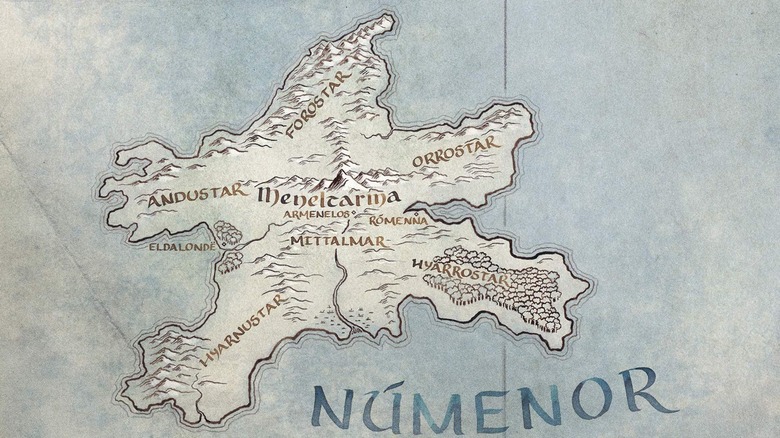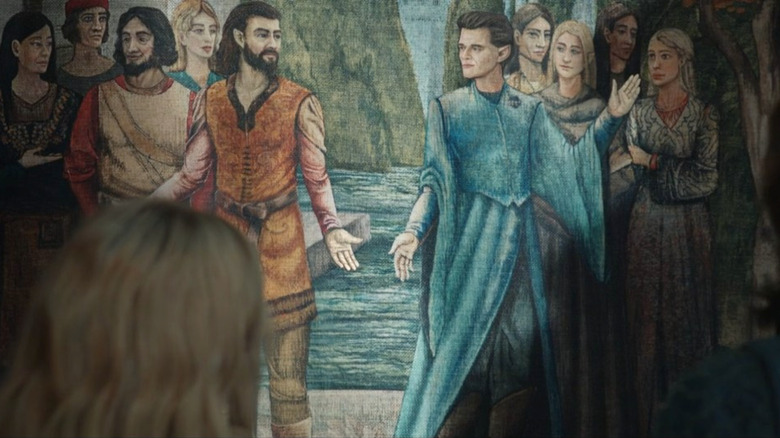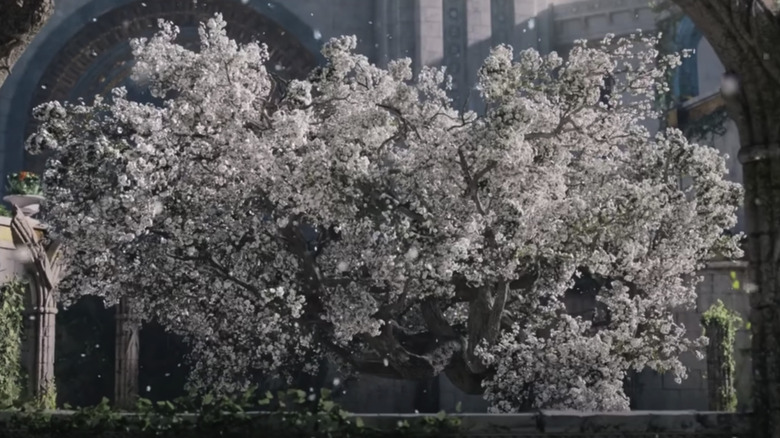What Was Númenor Like Before The Rings Of Power?
Contains spoilers for "The Rings of Power" Season 1, Episode 6
Early in Season 1, Episode 6 of "The Rings of Power," Galadriel and Isildur meet for the first time. The pair have a conversation as they stand on the deck of a Númenórean ship and watch the sun rise over Middle-earth in the distance. As they talk about why Isildur joined the expedition, the young sailor explains that he did so to get away from his homeland of Númenor. When Galadriel questions this motive, Isildur responds, "That's not Númenor. Not the real Númenor, anyway, if it ever existed." Galadriel responds that it still exists, even if only in the heart of men like Isildur — a veiled reference to his key role in helping the spirit of Númenor survive later on in the story.
But what is this reference to a Númenor that doesn't exist anymore? The island looks pretty glamorous when we see it earlier in the season. It's covered in impressive buildings and populated with people who have everything they need. Of course, as time goes on, we see that there are political elements at play that are making things a bit awkward. One group holds on to past traditions while others push forward for progress. The two worldviews aren't just talking points either. They're a superficial element of a serious issue that, at the time of "The Rings of Power," has transformed Númenor into a proud and bitter nation that rejects the Elves and is preparing to bite the very hand that feeds it.
Before all of that drama plays out over the course of the rest of the show's five-season arc, though, it's worth taking a quick stroll through Númenor's history to see just what the "real Númenor" that Isildur references looked like in the first place.
Númenor is the Land of Gift
After the world-shattering end of the First Age, the Valar decide to give a gift to the Men who helped overthrow the first Dark Lord, Morgoth. While most Men fought for the Dark Lord, three clans of Men, known as the Edain, had resisted him and fought alongside the Elves. "The Silmarillion" says that after Morgoth's defeat, "A land was made for the Edain to dwell in, neither part of Middle-earth nor of Valinor, for it was sundered from either by a wide sea; yet it was nearer to Valinor."
The island is literally raised out of the sea, shaped like a five-pointed star, and enriched with natural elements (possibly even the precious metal mithril). The Elves even visit it, bringing fountains and flowers to set the stage for Men's arrival from Middle-earth. When it's ready, the Edain are led over the seas to the island, which is initially called Andor, the Land of Gift.
However, it's given several other names too. "The Silmarillion" says, "They called that land Elenna, which is Starwards; but also Anadûnê, which is Westernesse, Númenórë in the High Eldarin tongue." It is a safe haven from the many different perils of Middle-earth, and it allows the Men of Númenor to establish themselves in heavenly bliss near the Blessed Realm ... even though they're forbidden to go any further or visit those immortal lands themselves.
The early Númenóreans have really healthy, long lives
Another side effect of the Edain's faithfulness in the war against Morgoth is the blessing of unusually long lifespans. "The Silmarillion" says, "They were given wisdom and power and life more enduring than any others of mortal race have possessed," and although they were mortal, "their years were long, and they knew no sickness, ere the shadow fell upon them."
This concept of unusually long lifespans is particularly strong in the line of Númenórean kings — and with good reason too. Along with the general gift of longer life, the first King of Númenor is Elros, the Half-elven brother of Elrond. While his twin brother chooses immortality, Elros opts for a mortal life, but even then, his immortal blood means he lives for five centuries before he finally kicks the bucket. While his royal descendants don't live that long, they do inherit his blood and continue to live longer lives, even compared to their blessed subjects.
The text also describes the almost Elven characteristics that the Men of Númenor start to exhibit: "Therefore they grew wise and glorious, and in all things more like to the Firstborn than any other of the kindreds of Men; and they were tall, taller than the tallest of the sons of Middle-earth; and the light of their eyes was like the bright stars." From their increased longevity to supernatural bodily characteristics to possessing unique levels of wisdom, the early Númenóreans are a uniquely blessed people.
Blessed by the West
Early Númenor is an anointed land that hosts a powerful nation of inhabitants who are unusually safe, long-lived, and ultra-wise. But the blessings don't stop there. While they aren't allowed to visit the immortal lands in the West, the Dúnedain (another name for the Númenóreans and their descendants) is also the only group of Men who have regular contact with the Blessed Realm.
"The Silmarillion" states, "Thus the years passed, and while Middle-earth went backward and light and wisdom faded, the Dúnedain dwelt under the protection of the Valar and in the friendship of the Eldar, and they increased in stature both of mind and body." Elves would also come to visit them after they settled on their island, "sailing to Númenor in oarless boats, as white birds flying from the sunset." These Elves would bring gifts with them too, including birds, flowers, herbs, and even the Palantíri. They also bring the seedling that turns into the White Tree.
From its friends and protectors to the blessings of its people to its very geographic existence, Númenor is a hallowed and beatific place when it first comes into existence. However, in spite of their long life spans, the original inhabitants eventually die off, and their descendants inherit their blessings. This goes on for hundreds of years and many generations before "The Rings of Power" is set, and over that time, gratefulness slowly turns into pride and envy of the immortality of the Elves and Valar — two factors that set the stage for a dark descent and prompt Isildur to wonder if this glorious version of Númenor ever even really existed in the first place.



